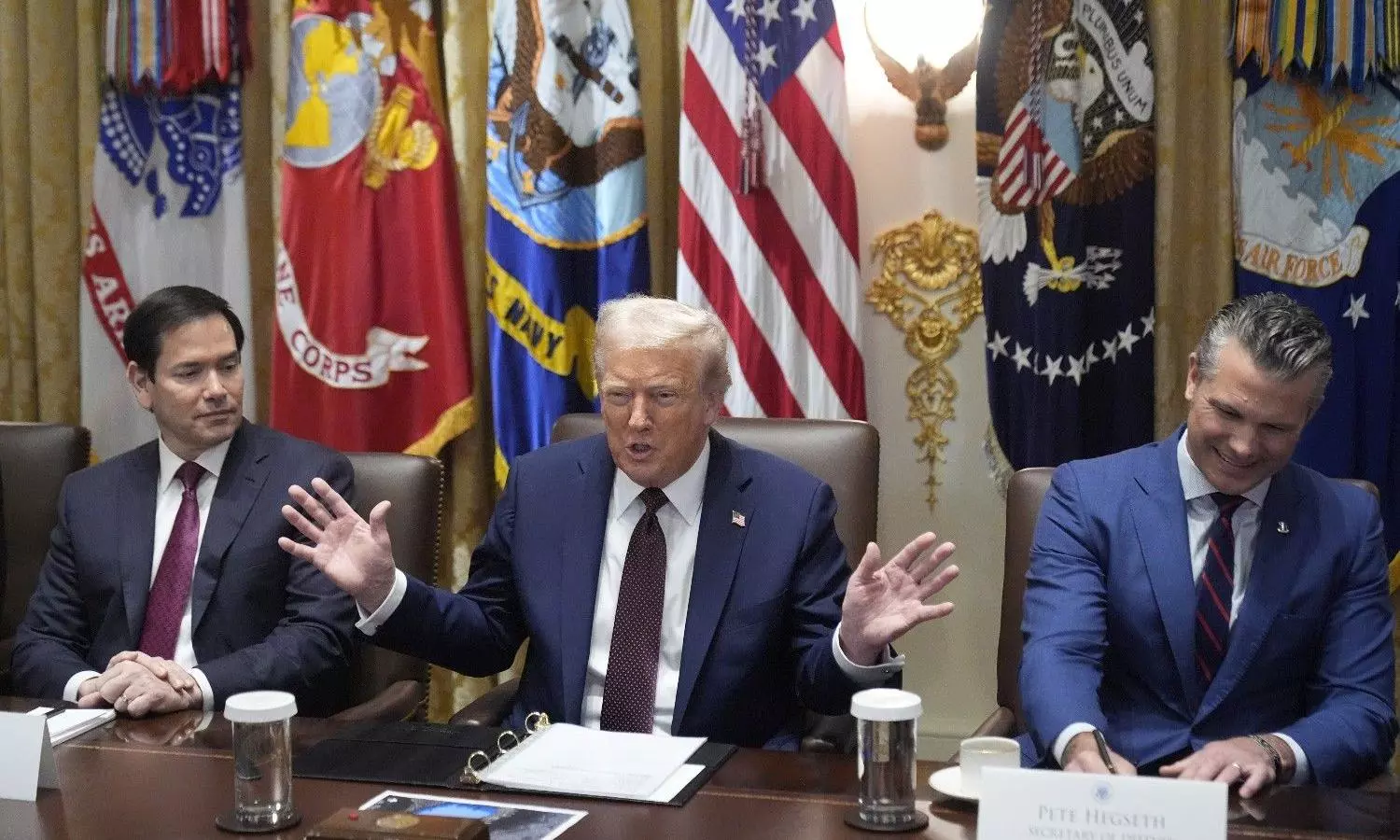
- Home
- India
- World
- Premium
- THE FEDERAL SPECIAL
- Analysis
- States
- Perspective
- Videos
- Sports
- Education
- Entertainment
- Elections
- Features
- Health
- Business
- Series
- In memoriam: Sheikh Mujibur Rahman
- Bishnoi's Men
- NEET TANGLE
- Economy Series
- Earth Day
- Kashmir’s Frozen Turbulence
- India@75
- The legend of Ramjanmabhoomi
- Liberalisation@30
- How to tame a dragon
- Celebrating biodiversity
- Farm Matters
- 50 days of solitude
- Bringing Migrants Home
- Budget 2020
- Jharkhand Votes
- The Federal Investigates
- The Federal Impact
- Vanishing Sand
- Gandhi @ 150
- Andhra Today
- Field report
- Operation Gulmarg
- Pandemic @1 Mn in India
- The Federal Year-End
- The Zero Year
- Science
- Brand studio
- Newsletter
- Elections 2024
- Events
- Home
- IndiaIndia
- World
- Analysis
- StatesStates
- PerspectivePerspective
- VideosVideos
- Sports
- Education
- Entertainment
- ElectionsElections
- Features
- Health
- BusinessBusiness
- Premium
- Loading...
Premium - Events

Trump may be a maverick, but past US administrations have been no saints when it comes to levelling accusations and bullying whosoever crossed Washington’s path
Even the most hardened critic of Indian Prime Minister Narendra Modi will find it difficult to accept the Trump administration’s description of the Russia-Ukraine conflict as “Modi’s War”. Most will agree at this point in time that the accusation is outlandish. Yet, given the United States’s track record of similar bamboozling descriptions, that stuck with tragic consequences, it cannot be dismissed peremptorily.
There are two possibilities. If Russian President Vladimir Putin agrees to a truce, then the issue is bound to die down. But, in the event of Putin holding out and refusing to sign on Trump’s dotted line, “Modi’s War” looks ominous for New Delhi.
Also read: Trump defends tariffs after federal court ruling, thanks Obama-appointed judge
Trump is now making it appear that he and the US are working for peace. The US has quietly buried the narrative that could singularly hold it responsible for triggering the war in the first place – the Joe Biden administration’s insistence that Ukraine would be admitted into the Western military alliance NATO.
Several weeks, preceding the start of the war, the US joined by its European allies held forth on why Ukraine would be admitted into NATO. Putin warned that the presence of NATO next door in Ukraine would endanger Russian security interests. Having witnessed the demise of the Soviet Union, Putin understandably did not want a similar disintegration of Russia. The US paid no heed to Putin’s warnings. When it seemed that Kyiv’s NATO membership was imminent, Russia invaded Ukraine.
‘Bully’ Trump targets weaker opponent
In the early days of the war, peace talks were held between Ukraine and Russian teams in neutral territory. When it seemed there was some progress, the Western powers led by the then British Prime Minister Boris Johnson reportedly convinced Ukrainian President Volodymyr Zelenskyy against any peace deal.
Chinese Ambassador in New Delhi Xu Feihong called Trump a “bully” in response to the 50 per cent tariffs imposed on India. Trump’s act of not subjecting China and the European Union to a similar accusation, despite both buying Russian oil, has puzzled India.
Also read: Trump aide Peter Navarro claims India's 'Brahmins profiteering' from Russian oil trade
Zelenskyy was promised weapons, financial aid and related logistical support to continue the fight. Since then, the war has raged on. But now Trump is making it appear that India has helped prolong the fighting by buying Russian oil, in an attempt to erase the West’s culpability in instigating Russia’s invasion of Ukraine. In other words, creating a new narrative to distract attention from the crux of the conflict.
Chinese Ambassador in New Delhi Xu Feihong called Trump a “bully” in response to the 50 per cent tariffs imposed on India. Trump’s act of not subjecting China and the European Union to a similar accusation, despite both buying Russian oil, has puzzled India. But that is typical of a bully – go for the weaker opponent while giving a wide berth to the stronger. So, in the event Trump fails to swing a peace deal, the bully’s wrath will fall on India, with potentially graver consequences.
In the present case, the name-calling of Modi is entirely Trump’s doing. But, one cannot overlook the fact that he is doing this as the President of the United States. Trump may be a maverick, but past administrations have been no saints when it comes to levelling accusations, bullying and outright attacks on whosoever crossed Washington’s path.
The case of Saddam Hussein
Take the case of former Iraqi president Saddam Hussein who fell prey to a diabolical US narrative. He came to power in 1979, enabled by a coup engineered by the US’s CIA (Central Intelligence Agency). Saddam was considered Washington’s man in Baghdad. But, over the next few years he fell out of favour with the US when he attempted to forge policies that took care of Iraqi national interests.
Also read: India’s resurgent ties with China temporary, or for keeps?
He went to war with Iran in 1980, egged on by the US and its ally Saudi Arabia, only to find that Tehran was no pushover. By the time the eight-year war ended, Saddam had antagonised Ronald Reagan, followed by George Bush (Sr). Saddam invaded Kuwait, leading to the first Gulf War. Saddam’s relationship with Washington fully ruptured turning him into a target for the US. In 2001, after the 9/11 attacks, the George W Bush administration succeeded in creating a reason to depose the Iraqi president.
As bizarre as “Modi’s War”, Washington floated the narrative linking Saddam with the al-Qaeda. In reality the Iraqi president had nothing to do with the terror organisation. The accusation which was initially dismissed as far-fetched by many, over a few months found acceptance after the alleged link received credibility through various stories floated in the media.
The US, which had been eyeing Iraqi oil for several years, moved to invade Baghdad, armed with the narrative that discredited Saddam in many ways, prime among them his alleged link to the al-Qaeda leader Osama bin Laden. Once Washington’s job was done, the reality surfaced exposing Washington’s dubious narrative but by then it was too late.
The US, over the years, has repeatedly shown it acts in its own interest. But it cannot tolerate other nations acting in their interest. There is a tendency, globally, to assume that despite its questionable record, Washington is equitable in its dealings and that its actions are to protect democracy and people’s wishes – again, thanks to a successful projection of its “American dream” narrative. This narrative is at best a cynical co-option of people’s aspirations to be free and lead a comfortable life.
US’s stand on Israel in UNSC
Washington’s cynicism is best seen in the manner it has dealt with Israel’s nearly two-year assault on Gaza, described by many as a genocide. Some 62,000 people, made up mostly of civilians, women and children have been killed in relentless Israeli air strikes. Worse, Israel has been accused of creating an artificial famine and starving many to death, that has shocked large sections of the world.
Yet the US, unmindful of its status as a veritable super power and a veto-wielding member of the UN Security Council, is completely unmoved. The Joe Biden administration and now the Trump dispensation have repeatedly vetoed any resolution on Israel in the UN Security Council, using the single narrative that “Israel has the right to defend itself”. This is the narrative used by the US for the last eight decades, backing several actions of Israel in the occupied Palestinian territories that purportedly go against international law.
No other nation or a group has been able to stall or even question the US’s narrative and its veto power in the Security Council, which it has used routinely to safeguard Israel.
The US’s “Modi’s War” narrative buttressed by the crippling 50 per cent tariffs on Indian exports appears to be the result of a combination of New Delhi’s responses to Trump.
Iran is another country that has faced the wrath of the US’s narrative. Realising that the regime in Tehran posed a threat to Washington’s control of neighbouring Iraq after the ouster of Saddam Hussein, the US in 2004 spun a narrative that Iran was working towards building a nuclear bomb.
Ironically, it was an earlier US administration which had donated a reactor to enable Iran to develop its nuclear programme. Despite exhortations from the Islamic regime that its nuclear programme was meant only for peaceful purposes, the US narrative regarding a soon-to-be-tested Iranian nuclear bomb has stuck – culminating in the recent US missile strike on two of the country’s reactors. It has not mattered that senior officials of the International Atomic Energy Agency (IAEA) have repeatedly averred that Tehran does not seem to be developing a nuclear weapon.
But, as a consequence of the US’s narrative, Iran in fact, for most part of the last two decades, has had to suffer economic sanctions and diplomatic isolation.
How India hurt Trump’s ego
The US’s “Modi’s War” narrative buttressed by the crippling 50 per cent tariffs on Indian exports appears to be the result of a combination of New Delhi’s responses to Trump. The Indian prime minister, when he stated in Parliament that no world leader had spoken to him regarding a ceasefire in the recent India-Pakistan made it appear that Trump was lying in his repeated assertion of playing peacemaker between the two countries. Given that the US President is widely acknowledged and seen to have a big ego, India’s denial must have hurt.
More crucially, Trump’s vision of winning the Nobel Prize for Peace was rudely diluted by India refusing to support his claim. As an article in the New York Times, quoting Trump, said, “I won’t get a Nobel Peace Prize for stopping the war between India and Pakistan. No, I won’t get a Nobel Peace Prize no matter what I do.”
As if this were not enough, New Delhi refused to concede Trump’s demand that the Modi government open up India’s agricultural sector for the US market.
With Trump’s self-esteem “wounded”, his team has whipped up “Modi’s War”, apparently not satisfied with the 50 per cent tariff on India. More is to follow. Trump has reportedly decided not to come to India later in the year for the Quad summit – if true, for Modi and the ruling NDA government, the new US narrative is setting them up for a bruising confrontation with Washington.


